9 books about Kierkegaard

The Conquest of Dread
Anxiety from Kierkegaard to Xanax
Simon Wolfe Taylor
Harvard University Press
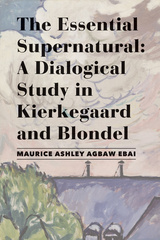
The Essential Supernatural
A Dialogical Study in Kierkegaard and Blondel
Maurice Ashley Agbaw-Ebai
St. Augustine's Press, 2022
Søren Kirkegaard and Maurice Blondel are positioned together in a dialogue regarding the vision of the supernatural. Maurice Ashley Agbaw-Ebai draws from this a sharper image of the preeminent place religious experience possesses in human life and thought. Kirkegaard's lament of Christian lack of fervor and Blondel's concern that religion and philosophy no longer interact are both examined and Agbaw-Ebai concludes that they both indicate the same outcome: a "dominant leveling of society" that robs religion of its particularity. This devastates the individual because he is no longer challenged to seek a relationship with God and expose himself to the supernatural. The boundlessness of man must be acknowledged or else his actions will never be understood, and religious experience and philosophy must coexist with mutual reference or self-knowledge will never amount to the discovery of supernatural destiny. And this, asserts Agbaw-Ebai, is the shared urgency of both Kirkegaard and Blondel.
Like these philosophers who have preceded him, Agbaw-Ebai exhorts us to never allow the sense of our relation to the supernatural as a settled matter. The philosophy of religion we have inherited does not protect us from having to confront our own subjectivity with autonomy: to be God without God and against God, or to be God with and through God.
Like these philosophers who have preceded him, Agbaw-Ebai exhorts us to never allow the sense of our relation to the supernatural as a settled matter. The philosophy of religion we have inherited does not protect us from having to confront our own subjectivity with autonomy: to be God without God and against God, or to be God with and through God.
[more]

Kierkegaard And The Ends Of Language
Geoffrey A. Hale
University of Minnesota Press, 2002
A timely and original intervention in our understanding of this major philosopher through the lens of his influence on others.
What do we read when we read Kierkegaard? How do we know? Insisting that Kierkegaard remains a far more enigmatic and paradoxical writer than is often assumed, Geoffrey A. Hale argues that the best way to approach Kierkegaard's work and understand its significance for our own thought is to retrace its formative influence on major intellectuals of the early twentieth century.
In mutually reflective readings of Kierkegaard's foundational texts through the work of three pivotal authors-Franz Kafka, Theodor Adorno, and Rainer Maria Rilke-Hale shows how each of these writers draws attention to the unwavering sense of human finitude that pervades all of Kierkegaard's work and, with it, the profoundly unsettling indeterminacy in which it results. It is the very limitations of language, Hale argues, that hold it open to meaning, to interpretation, and thus to freedom. Resisting clear circumscription in this way, Kierkegaard's work becomes all the more fruitful to us-and all the more challenging-to the extent that it resists our understanding.
Geoffrey A. Hale received a Ph.D. in German from The Johns Hopkins University and studied at the Free University in Berlin through a Fulbright scholarship.
[more]
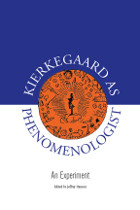
Kierkegaard as Phenomenologist
An Experiment
Jeffrey Hanson
Northwestern University Press, 2010
Kierkegaard has undoubtedly been an influence on phenomenological thinking, but he has rarely if ever been read as a phenomenologist himself. Recent developments in phenomenology have expanded our conception of the discipline itself and the varieties of experience it can address. Is it possible that Kierkegaard, a canonical figure by any measure, can be reappraised in light of these developments? Or more radically, is it possible that the frontiers of phenomenological investigation were already broached by Kierkegaard even before phenomenology was formally defined by Husserl?
In Kierkegaard as Phenomenologist: An Experiment, Jeffrey Hanson embarks on a project to locate Kierkegaard within the current phenomenological discussion. This work is an experiment inasmuch as the plausibility of the undertaking itself will be determined only by the outcome. Some of the contributors clearly regard it as possible to read Kierkegaard as a phenomenologist. Others plainly do not and will contest the very hypothesis that forms the basis of this experiment.
As with any experiment, the larger discussion will determine its success, but Kierkegaard as Phenomenologist lays the groundwork for two exciting possibilities: first, that Kierkegaard scholarship will be renewed, and second, that the meaning of phenomenology itself will be reconsidered.
In Kierkegaard as Phenomenologist: An Experiment, Jeffrey Hanson embarks on a project to locate Kierkegaard within the current phenomenological discussion. This work is an experiment inasmuch as the plausibility of the undertaking itself will be determined only by the outcome. Some of the contributors clearly regard it as possible to read Kierkegaard as a phenomenologist. Others plainly do not and will contest the very hypothesis that forms the basis of this experiment.
As with any experiment, the larger discussion will determine its success, but Kierkegaard as Phenomenologist lays the groundwork for two exciting possibilities: first, that Kierkegaard scholarship will be renewed, and second, that the meaning of phenomenology itself will be reconsidered.
[more]
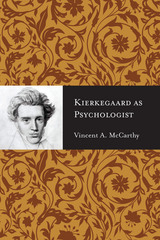
Kierkegaard as Psychologist
Vincent A. McCarthy
Northwestern University Press, 2015
Kierkegaard’s psychological thought has always been acknowledged as very rich—Reinhold Niebuhr hailed him as the greatest psychologist of the soul since Augustine—and has had a major influence on Heidegger, Sartre, and existential psychoanalysis. Nevertheless, his accomplishment has not always been fully appreciated, in part because it is so scattered across his works. As Vincent McCarthy demonstrates in Kierkegaard as Psychologist, Kierkegaard was pursuing “psychology” before there was a formally recognized academic field bearing that name, and a coherent thread runs through the so-called pseudonymous works. McCarthy elucidates often-difficult texts, highlights the rich psychological dimension of Kierkegaard’s thought, and provides an introduction for the nonspecialist and a commentary on Kierkegaard’s psychology that will interest both specialists and nonspecialists, while engaging in rich comparisons with such figures as Freud and Heidegger.
[more]
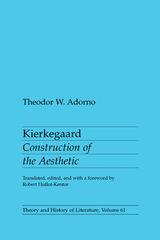
Kierkegaard
Construction of the Aesthetic
Theodor Adorno
University of Minnesota Press, 1989
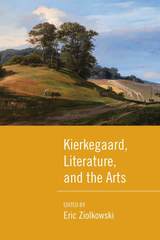
Kierkegaard, Literature, and the Arts
Edited by Eric Ziolkowski
Northwestern University Press, 2018
In this volume fifteen eminent scholars illuminate the broad and often underappreciated variety of the nineteenth‑century Danish thinker Søren Kierkegaard’s engagements with literature and the arts.
The essays in Kierkegaard, Literature, and the Arts, contextualized with an insightful introduction by Eric Ziolkowski, explore Kierkegaard’s relationship to literature (poetry, prose, and storytelling), the performing arts (theater, music, opera, and dance), and the visual arts, including film. The collection is rounded out with a comparative section that considers Kierkegaard in juxtaposition with a romantic poet (William Blake), a modern composer (Arnold Schoenberg), and a contemporary singer‑songwriter (Bob Dylan). Kierkegaard was as much an aesthetic thinker as a philosopher, and his philosophical writings are complemented by his literary and music criticism.
Kierkegaard, Literature, and the Arts will offer much of interest to scholars concerned with Kierkegaard as well as teachers, performers, and readers in the various aesthetic fields discussed.
CONTRIBUTORS: Christopher B. Barnett, Martijn Boven, Anne Margrete Fiskvik, Joakim Garff, Ronald M. Green, Peder Jothen, Ragni Linnet, Jamie A. Lorentzen, Edward F. Mooney, George Pattison, Nils Holger Petersen, Howard Pickett, Marcia C. Robinson, James Rovira
The essays in Kierkegaard, Literature, and the Arts, contextualized with an insightful introduction by Eric Ziolkowski, explore Kierkegaard’s relationship to literature (poetry, prose, and storytelling), the performing arts (theater, music, opera, and dance), and the visual arts, including film. The collection is rounded out with a comparative section that considers Kierkegaard in juxtaposition with a romantic poet (William Blake), a modern composer (Arnold Schoenberg), and a contemporary singer‑songwriter (Bob Dylan). Kierkegaard was as much an aesthetic thinker as a philosopher, and his philosophical writings are complemented by his literary and music criticism.
Kierkegaard, Literature, and the Arts will offer much of interest to scholars concerned with Kierkegaard as well as teachers, performers, and readers in the various aesthetic fields discussed.
CONTRIBUTORS: Christopher B. Barnett, Martijn Boven, Anne Margrete Fiskvik, Joakim Garff, Ronald M. Green, Peder Jothen, Ragni Linnet, Jamie A. Lorentzen, Edward F. Mooney, George Pattison, Nils Holger Petersen, Howard Pickett, Marcia C. Robinson, James Rovira
[more]
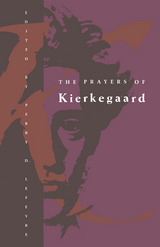
The Prayers of Kierkegaard
Edited by Perry D. LeFevre
University of Chicago Press, 1996
Soren Kierkegaard's influence has been felt in many areas of human thought from theology to psychology. The nearly one hundred of his prayers gathered here from published works and private papers, not only illuminate his own life of prayer, but speak to the concerns of Christians today.
The second part of the volume is a reinterpretation of the life and thought of Kierkegaard. Long regarded as primarily a poet or a philosopher, Kierkegaard is revealed as a fundamentally religious thinker whose central problem was that of becoming a Christian, of realizing personal existence. Perry D. LeFevre's penetrating analysis takes the reader to the religious center of Kierkegaard's world.
The second part of the volume is a reinterpretation of the life and thought of Kierkegaard. Long regarded as primarily a poet or a philosopher, Kierkegaard is revealed as a fundamentally religious thinker whose central problem was that of becoming a Christian, of realizing personal existence. Perry D. LeFevre's penetrating analysis takes the reader to the religious center of Kierkegaard's world.
[more]
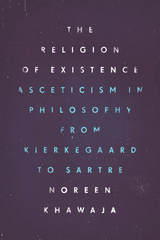
The Religion of Existence
Asceticism in Philosophy from Kierkegaard to Sartre
Noreen Khawaja
University of Chicago Press, 2016
TheReligion of Existence reopens an old debate on an important question: What was existentialism?
At the heart of existentialism, Noreen Khawaja argues, is a story about secular thought experimenting with the traditions of European Christianity. This book explores how a distinctly Protestant asceticism formed the basis for the chief existentialist ideal, personal authenticity, which is reflected in approaches ranging from Kierkegaard’s religious theory of the self to Heidegger’s phenomenology of everyday life to Sartre’s global mission of atheistic humanism. Through these three philosophers, she argues, we observe how ascetic norms have shaped one of the twentieth century’s most powerful ways of thinking about identity and difference—the idea that the “true” self is not simply given but something that each of us is responsible for producing.
Engaging with many central figures in modern European thought, this book will appeal to philosophers and historians of European philosophy, scholars of modern Christianity, and those working on problems at the intersection of religion and modernity.
At the heart of existentialism, Noreen Khawaja argues, is a story about secular thought experimenting with the traditions of European Christianity. This book explores how a distinctly Protestant asceticism formed the basis for the chief existentialist ideal, personal authenticity, which is reflected in approaches ranging from Kierkegaard’s religious theory of the self to Heidegger’s phenomenology of everyday life to Sartre’s global mission of atheistic humanism. Through these three philosophers, she argues, we observe how ascetic norms have shaped one of the twentieth century’s most powerful ways of thinking about identity and difference—the idea that the “true” self is not simply given but something that each of us is responsible for producing.
Engaging with many central figures in modern European thought, this book will appeal to philosophers and historians of European philosophy, scholars of modern Christianity, and those working on problems at the intersection of religion and modernity.
[more]
READERS
Browse our collection.
PUBLISHERS
See BiblioVault's publisher services.
STUDENT SERVICES
Files for college accessibility offices.
UChicago Accessibility Resources
home | accessibility | search | about | contact us
BiblioVault ® 2001 - 2024
The University of Chicago Press









